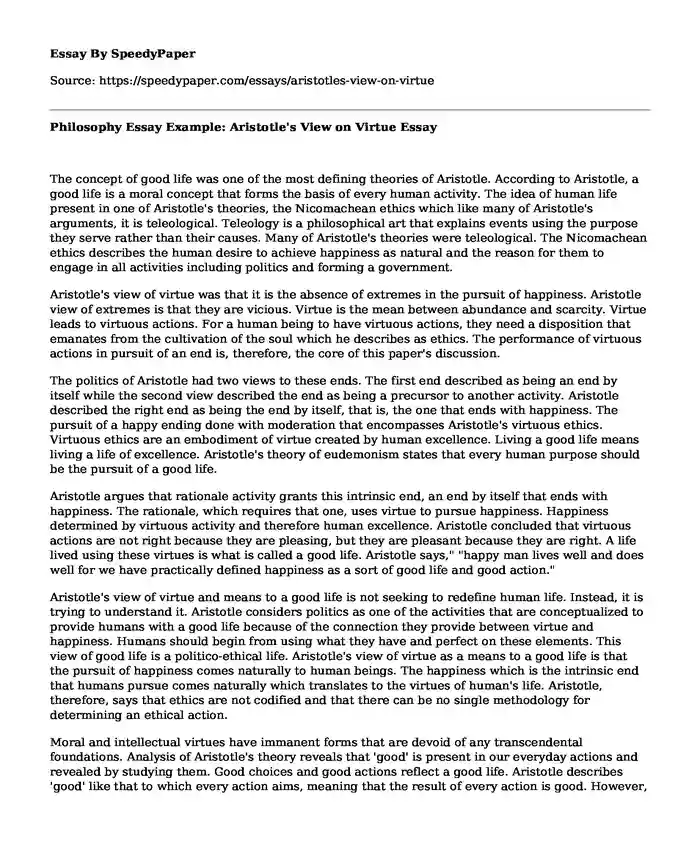
| Type of paper: | Essay |
| Categories: | Philosophers |
| Pages: | 4 |
| Wordcount: | 836 words |
The concept of good life was one of the most defining theories of Aristotle. According to Aristotle, a good life is a moral concept that forms the basis of every human activity. The idea of human life present in one of Aristotle's theories, the Nicomachean ethics which like many of Aristotle's arguments, it is teleological. Teleology is a philosophical art that explains events using the purpose they serve rather than their causes. Many of Aristotle's theories were teleological. The Nicomachean ethics describes the human desire to achieve happiness as natural and the reason for them to engage in all activities including politics and forming a government.
Aristotle's view of virtue was that it is the absence of extremes in the pursuit of happiness. Aristotle view of extremes is that they are vicious. Virtue is the mean between abundance and scarcity. Virtue leads to virtuous actions. For a human being to have virtuous actions, they need a disposition that emanates from the cultivation of the soul which he describes as ethics. The performance of virtuous actions in pursuit of an end is, therefore, the core of this paper's discussion.
The politics of Aristotle had two views to these ends. The first end described as being an end by itself while the second view described the end as being a precursor to another activity. Aristotle described the right end as being the end by itself, that is, the one that ends with happiness. The pursuit of a happy ending done with moderation that encompasses Aristotle's virtuous ethics. Virtuous ethics are an embodiment of virtue created by human excellence. Living a good life means living a life of excellence. Aristotle's theory of eudemonism states that every human purpose should be the pursuit of a good life.
Aristotle argues that rationale activity grants this intrinsic end, an end by itself that ends with happiness. The rationale, which requires that one, uses virtue to pursue happiness. Happiness determined by virtuous activity and therefore human excellence. Aristotle concluded that virtuous actions are not right because they are pleasing, but they are pleasant because they are right. A life lived using these virtues is what is called a good life. Aristotle says," "happy man lives well and does well for we have practically defined happiness as a sort of good life and good action."
Aristotle's view of virtue and means to a good life is not seeking to redefine human life. Instead, it is trying to understand it. Aristotle considers politics as one of the activities that are conceptualized to provide humans with a good life because of the connection they provide between virtue and happiness. Humans should begin from using what they have and perfect on these elements. This view of good life is a politico-ethical life. Aristotle's view of virtue as a means to a good life is that the pursuit of happiness comes naturally to human beings. The happiness which is the intrinsic end that humans pursue comes naturally which translates to the virtues of human's life. Aristotle, therefore, says that ethics are not codified and that there can be no single methodology for determining an ethical action.
Moral and intellectual virtues have immanent forms that are devoid of any transcendental foundations. Analysis of Aristotle's theory reveals that 'good' is present in our everyday actions and revealed by studying them. Good choices and good actions reflect a good life. Aristotle describes 'good' like that to which every action aims, meaning that the result of every action is good. However, this view will leave an infinite reverse path to 'goods.' Aristotle, therefore, suggests a classification of intrinsic good based on the very end of every 'good.' Aristotle categorized goods into external goods, and some defined as relating to the body or soul.
The 'goods' that aimed at the satisfaction of the soul are the ones given priority. As Aristotle himself puts it," We call those that relate to soul most properly and truly 'goods' and psychical actions and activities we class as relating to the soul." These types of goods are the ultimate final. As earlier describes, the ultimate final is those goods that are desirable for their own sake and not for the sake of something else. These types of goods are self-sufficient, in that even when isolated they are still desirable and lack nothing. "Such a thing, happiness above all else, is held to be; for this, we always choose for self and never for the sake of something else." Happiness is, therefore, an ultimate good placed above all other 'goods.'
Conclusion
Aristotle's view of virtue and the means to good life describes good life as the pursuit of happiness. Happiness is a satisfaction of the soul. Therefore it is considered an ultimate final. Like all other ultimate finals, happiness should is given priority over other goods that are external. To live a good life one needs to live a virtuous life to achieve human excellence. Therefore, according to Aristotle, virtue is a means to a good life.
Cite this page
Philosophy Essay Example: Aristotle's View on Virtue. (2022, Jun 16). Retrieved from https://speedypaper.com/essays/aristotles-view-on-virtue
Request Removal
If you are the original author of this essay and no longer wish to have it published on the SpeedyPaper website, please click below to request its removal:
- Free Essay on How to Write a Personal Statement for College
- Free Essay: Business Classical Exploration for Two-sided Platforms
- Essay Sample on Formal Operational Thought
- Free Essay: MBA and Leadership
- Strategies for Improving Emotional Intelligence, Essay Example
- Free Essay Sample: Local News
- Free Essay on Greece Mythology
Popular categories




